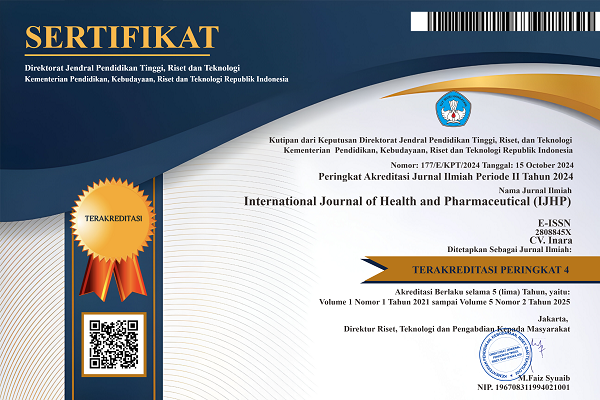Strengthening The Academic Atmosphere In Higher Health Education With Character And Social Responsibility
DOI:
https://doi.org/10.51601/ijhp.v3i1.124Keywords:
Character education, Campus atmosphere, STIKES BPI.Abstract
Education is a systematic process to improve human dignity holistically, which allows the three most elementary
dimensions of humanity above to develop optimally. Thus, education should be a strategic vehicle for efforts to develop
all the potential of individuals, so that the ideals of building Indonesian people as a whole can be achieved. The
development of national education in the future is based on the paradigm of building Indonesian people as a whole, which
functions as subjects who have the capacity to actualize the potential and dimensions of humanity optimally.build the
portion of curricular activities with extra-curricular activities in Campus that are getting closer to balance. The existence
of student organizations in Campus will be able to involve students in the development and self-actualization, as well as
improve student competitiveness. culture and empowerment of students that take place must be able to give an example,
build willpower, and develop student creativity in the learning process, through developing a cultural scheme of reading,
writing, and arithmetic for all citizens, as Community Empowerment. The problem of the nation's strength lies in the
capacity and capability of the generation, the purpose of higher education related to character building is basically to
encourage the birth of good people. Students who have a positive character will have an attractive personality, ethical,
unpretentious, honest, intelligent, caring, and tough. The campus atmosphere will be able to grow and develop good
character will encourage students to grow with the capacity and commitment to do the best things and do everything with
purpose. Students with good character will do their best as an offering to God Almighty, by optimizing their potential and
accompanied by full awareness.
Downloads
References
Abbas, Syahrizal. 2008. Manajemen Perguruan Tinggi, Jakarta: Kencana
Afnan. 2004. Manajemen Pendidikan. Jakarta: Remaja Rosda Karya.
Amri, Sofan. Konstruksi Pengembangan Pembelajaran: Pengaruh Terhadap Mekanisme dan Praktik Kurikulum.
Jakarta: Pestasi Pustakaraya, 2010.
Aqib, Zainal. Model-Model, Media dan Strategi Pembelajaran Kontekstual (Inovatif). Bandung: Yrama Widya,
Atmodiwiryo, Soebagio. 2005. Manajemen Pendidikan di Indonesia, Jakarta:Ardadidya Jaya
Arcaro, Jerome S., 2005, Pendidikan Berbasis Mutu: Prinsip-Prinsip Perumusan Dan Tata Langkah Penerapan,
Yogyakarta: Pustaka Pelajar.
Berns, Robert G. dan Erickson, Patricia M. Contextual Teaching and Learning: Preparing Students for the New
Economy. Washington, DC: Office of Vocational and Adult Education, 2001.
Croby B, 2009, Manajemen Mutu, Total Quality Management. Edisi Revisi, Yogyakarta
Dalyono, M. Psikologi Pendididkan. Jakarta: PT. Rineka Cipta, 1997.
International Journal of Health and Pharmaceutical
Enoch, Yusuf. 1992. Dasar-Dasar Perencanaan Pendidikan, Jakarta: BinaAksara
Fahmi, Irham. 2014. Manajemen Strategis Teori dan Aplikasi, Bandung: Alfabeta
Hadis, Abdul dan Nurhayati. 2010. Manajemen Mutu Pendidikan, Bandung: Alfabeta
Hamalik,Oemar. 2014. Kurikulum dan Pembelajaran, Jakarta: Bumi Aksara
Handoko, T. Hani. 2003. Manajemen, Yogyakarta: BPFE
Haines, Stephen G. 2000. The System Thinking Approach to Strategic Planning and Management, London: St.
Lucie Press
Ismani, 2007. Kinerja: Teori, Penilaian dan Penelitian. Jakarta: Fakultas Kesehatan Masyarakat UI
Johnson, Eline B. Contextual Teaching and Learning. California: Corwin Press, inc, 2002.
Keith, D. (2010). Organizational Behavior – Human Behavior at Work (13th Editi).New Delhi: Mcgraw Hill
Company.
Muldofir, Ali dan Fatimatur, Evi. Desain Pembelajaran Inivatif Dari Teori Ke Praktek. Jakarta: PT. Rajagrafindo
Persada, 2016.
Mulyasa, E. (2008). Standar Kompetisi dan Sertifikasi Guru. Bandung: PT. Remaja Rosda Karya.
Made, Pridate. 1994. Supervisi Pendidikan. Jakarta: Rineka Cipta.
Nadesul, (2008). Jaminan Mutu Pelayanan Kesehatan, Jakarta: PT. Rineka Cipta
Nanik, Rubiyanto dan Dani. Strategi Pembelajaran Holistik di Sekolah. jakarta: Pt.Prestasi Pustakaraya, 2010.
Nasution, M.N., 2004, Manajemen Mutu Terpadu, Jakarta: Ghalia Indonesia.
Nurkolis, 2006, Manajemen Berbasis Sekolah, Jakarta: PT. Gramedia Widiasarana Indonesia.
Notoatmodjo, 2003. Pendidikan dan Perilaku Kesehatan. Jakarta : RinekaCipta
Pidarta, Made, 2004, Manajemen Pendidikan Indonesia, Jakarta: PT. Rineka Cipta.
Rassuli, Ali; John P. Manzer, 2005, “Teach Us to Learn: Multivariate Analysis of Perception of Success in Team
Learning”, Journal of Education for Business, Washington.
Purwanto, Ngalim. Psikologi Pendidikan. Bandung: PT. Remaja Rosdkarya, 1992.
Robbins, S.P. 2003. Perilaku Organisasi. Jilid I. Jakarta: PT INDEKS Kelompok Gramedia
Robbins, S.P., & Coulter, M. (2012). Management (11th ed). Upper Saddle River,New Jersey: Pearson
Education,Inc.,publishing as Prentice Hall.
Sadiman,Arif S. Media Pendidikan Pengertian, Pengembangan dan Pemanfaatana. Jakarta: Pustekom Dikbud,
Sanjaya ,Wina. Strategi Pembelajaran Berorientasi Standar Proses Pendidikan. Jakarta: Kencana, 2006.
Suprijono, Agus. Cooperative Learning Teori dan Aplikasi Pakem. Yogyakarta: Pustaka Pelajar, 2009.
Tilaar, H. A. R. (2001). Manajemen Pendidikan Nasional: Kajian Pendidikan Masa Depan. Bandung: PT Remaja
Rosda Karya.UU RI. UU No 20 Tahun 2003 Tentang Sistem Pendidikan Nasional
Walgito, Bimo. Pengantar Psikologi Umum. Jakarta: Andi, 2004.
Downloads
Published
How to Cite
Issue
Section
License
Copyright (c) 2022 Aulia Hervy Anggraeni, Haura Karlina, Ratna Utami Wijayanti, Wahyu Wismanto Hadi

This work is licensed under a Creative Commons Attribution-NonCommercial 4.0 International License.





























